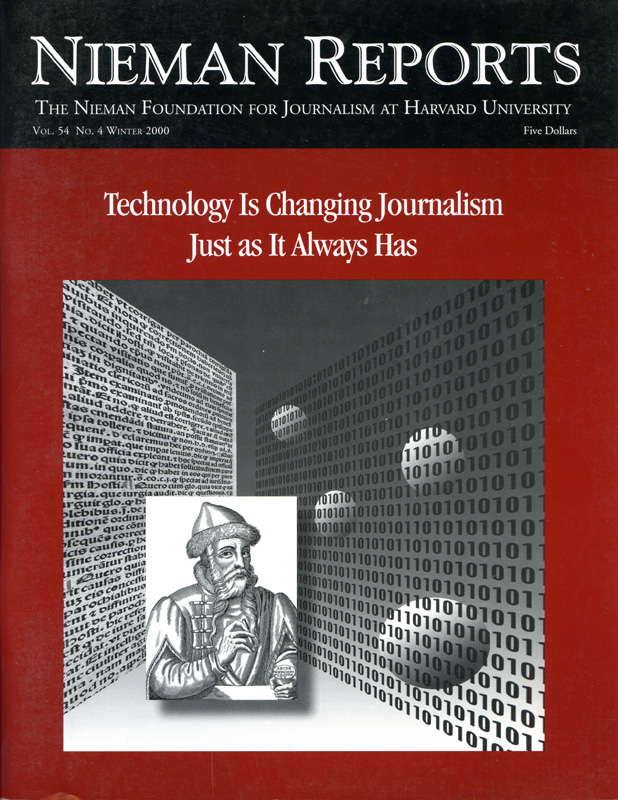
Technology Is Changing Journalism Just as It Always Has
Our journey into the digital future begins with an essay by Tom Regan, associate editor of The Christian Science Monitor’s Web site. His advice: Remember that technology is changing journalism, “as it always has;” wireless is the next publishing realm, and the Web—as a news distribution method—is (almost) already dead.
As I left for my Nieman year in August 1999, we were just getting desktop PC’s to replace an old system. The Internet was still the new guy in the The newsroom. We said hello and tried to be friendly. Occasionally we picked his brain and let him entertain us.
Since my return this summer, he’s become a valuable pal.
The Internet may yet cost us our jobs, ruin our lives, and wreck our democracy. But I’ve been constantly amazed at how much it’s helped me do stories and even find them since I got back. This may be old news for a lot of journalists, but it’s been new to me.
I cover politics in North Carolina. When finance reports came out just before the election, I saw that executives from one company had accounted for a third of the money raised by one candidate for state labor commissioner. I checked with the labor department to see if they had a file on the company and was directed to an OSHA Web site. There I found the company had a series of outstanding fines. They happened to add up to about the same amount the executives had given the rival party candidate.
Before the election, I did some stories about our new early voting program that let people cast ballots up to three weeks before November 7. When I needed statewide registration figures, I found them on the state board of elections’ Web site. So were the phone numbers of election directors in all 100 counties. A couple of years ago, the search would have involved at least a long phone call and some faxes. Then, when I needed somebody in Texas to talk about how early voting had worked in that state, I e-mailed a friend at the Austin American-Statesman. I had my contact a couple of minutes later.
Four years ago it was hard to tell how much money Carolinians were contributing to the presidential candidates. This year it took a few clicks. I went to FECInfo, a site that tracks campaign spending, and called up a state-by-state sort of Bush and Gore contributors. It turned out Bush was sweeping up money as well as votes in the Carolinas.
When I left Charlotte in 1999, accessing our own archives was still a slow, tedious process. Accessing others wasn’t much easier. Nexis, for example, was available on just a few machines in a corner. Now we have Nexis on our PC’s, and our archives are an easy click on the paper’s Intranet. Researching stories has never been easier.
A couple months before leaving for Cambridge, I’d written a piece about how the Internet is changing the way people interact with government. I still wasn’t aware of how much it was changing the way we did business, too. Of course, there’s a lot of the Internet not to trust. But there’s an increasing amount of information that’s accurate and accessible. I’d be lost without it.
Jim Morrill is a reporter for The Charlotte Observer. He was in the Nieman class of 2000.
Since my return this summer, he’s become a valuable pal.
The Internet may yet cost us our jobs, ruin our lives, and wreck our democracy. But I’ve been constantly amazed at how much it’s helped me do stories and even find them since I got back. This may be old news for a lot of journalists, but it’s been new to me.
I cover politics in North Carolina. When finance reports came out just before the election, I saw that executives from one company had accounted for a third of the money raised by one candidate for state labor commissioner. I checked with the labor department to see if they had a file on the company and was directed to an OSHA Web site. There I found the company had a series of outstanding fines. They happened to add up to about the same amount the executives had given the rival party candidate.
Before the election, I did some stories about our new early voting program that let people cast ballots up to three weeks before November 7. When I needed statewide registration figures, I found them on the state board of elections’ Web site. So were the phone numbers of election directors in all 100 counties. A couple of years ago, the search would have involved at least a long phone call and some faxes. Then, when I needed somebody in Texas to talk about how early voting had worked in that state, I e-mailed a friend at the Austin American-Statesman. I had my contact a couple of minutes later.
Four years ago it was hard to tell how much money Carolinians were contributing to the presidential candidates. This year it took a few clicks. I went to FECInfo, a site that tracks campaign spending, and called up a state-by-state sort of Bush and Gore contributors. It turned out Bush was sweeping up money as well as votes in the Carolinas.
When I left Charlotte in 1999, accessing our own archives was still a slow, tedious process. Accessing others wasn’t much easier. Nexis, for example, was available on just a few machines in a corner. Now we have Nexis on our PC’s, and our archives are an easy click on the paper’s Intranet. Researching stories has never been easier.
A couple months before leaving for Cambridge, I’d written a piece about how the Internet is changing the way people interact with government. I still wasn’t aware of how much it was changing the way we did business, too. Of course, there’s a lot of the Internet not to trust. But there’s an increasing amount of information that’s accurate and accessible. I’d be lost without it.
Jim Morrill is a reporter for The Charlotte Observer. He was in the Nieman class of 2000.


